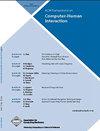How Engineers’ Imaginaries of Healthcare Shape Design and User Engagement: A Case Study of a Robotics Initiative for Geriatric Healthcare AI Applications
IF 6.6
2区 计算机科学
Q1 COMPUTER SCIENCE, CYBERNETICS
引用次数: 4
Abstract
In the development of robotics and Artificial Intelligence (AI) for healthcare, human-centered approaches seek to meet the requirements of healthcare practice and address social and ethical aspects proactively. In this work, an important but neglected aspect of human-computer interaction (HCI) is how engineers understand and envision the healthcare context. Drawing on insights from STS on engineers’ imaginaries and their role in shaping research and development of new technologies, we propose engineers’ imaginaries of healthcare as a point of analysis and intervention for ethical and social aspects of AI and robotics for healthcare. To illustrate the utility of this lens, we use it to on report a case study of an engineering project that develops robotic and AI applications for healthcare. We followed and sought to advance an embedded ethics and social science approach, where ethicists and social scientists accompanied this engineering project using direct interdisciplinary collaboration, observations, and in-depth qualitative interviews with the project’s engineers (n = 18). We analyze how the engineers imagine healthcare as an environment for robots, healthcare workers as potential users, and healthcare practices, and how these imaginaries connect to the design narratives that guide their work. Our findings provide pertinent input for HCI, STS, and engineering ethics related to healthcare AI and robotics, as they speak to prevalent narratives of “assistance” systems, aspects of how human healthcare practices are reframed and valued in the face of new technologies, questions of division of labor between machines and healthcare practitioners, and the implications of ‘acceptance’ as a frame for user-centered design.工程师对医疗保健形状设计和用户参与的想象:老年医疗保健AI应用机器人计划的案例研究
在医疗保健机器人和人工智能(AI)的发展中,以人为中心的方法寻求满足医疗保健实践的要求,并积极解决社会和道德问题。在这项工作中,人机交互(HCI)的一个重要但被忽视的方面是工程师如何理解和设想医疗保健环境。借鉴STS对工程师想象力及其在塑造新技术研发中的作用的见解,我们提出了工程师对医疗保健的想象,作为人工智能和医疗保健机器人的伦理和社会方面的分析和干预点。为了说明这个镜头的实用性,我们用它来报告一个工程项目的案例研究,该项目为医疗保健开发机器人和人工智能应用程序。我们遵循并寻求推进一种嵌入的伦理和社会科学方法,伦理学家和社会科学家通过直接的跨学科合作、观察和对项目工程师的深入定性访谈来伴随这个工程项目(n = 18)。我们分析了工程师如何将医疗保健想象为机器人的环境,将医疗保健工作者想象为潜在用户和医疗保健实践,以及这些想象如何与指导他们工作的设计叙述联系起来。我们的研究结果为与医疗人工智能和机器人相关的HCI、STS和工程伦理提供了相关的输入,因为它们涉及到“辅助”系统的流行叙述,面对新技术如何重构和评估人类医疗实践的各个方面,机器和医疗从业者之间的劳动分工问题,以及“接受”作为以用户为中心的设计框架的含义。
本文章由计算机程序翻译,如有差异,请以英文原文为准。
求助全文
约1分钟内获得全文
求助全文
来源期刊

ACM Transactions on Computer-Human Interaction
工程技术-计算机:控制论
CiteScore
8.50
自引率
5.40%
发文量
94
审稿时长
>12 weeks
期刊介绍:
This ACM Transaction seeks to be the premier archival journal in the multidisciplinary field of human-computer interaction. Since its first issue in March 1994, it has presented work of the highest scientific quality that contributes to the practice in the present and future. The primary emphasis is on results of broad application, but the journal considers original work focused on specific domains, on special requirements, on ethical issues -- the full range of design, development, and use of interactive systems.
 求助内容:
求助内容: 应助结果提醒方式:
应助结果提醒方式:


